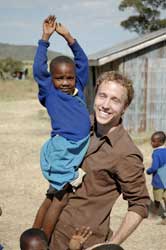Our lives changed over a bowl of cereal.
It was a regular spring morning in the suburbs north of Toronto. The sun was shining after yet another frigid winter. As was his morning ritual, Craig ran down the stairs of his home, grabbed his breakfast, and sat down with the newspaper to find the comics.
But before he could reach Doonesbury and Calvin and Hobbes, a headline on the front page caught Craig's attention. "Battled Child Labor, Boy, 12, Murdered." Beside it was the picture of 12-year-old Iqbal Masih, wearing a bright red vest with his fist pumped into the air.
Craig read on.
Iqbal had been a child laborer in Pakistan, sold into slavery at the age of four and chained to a carpet loom for years. One day he escaped and began touring the country -- and the world -- telling his story and speaking out against child bondage.
That is, until members of Pakistan's carpet industry silenced him with a bullet as he rode his bike.
Craig was stunned. At the time, he was also 12, but had had a very different life. Why had Iqbal faced so much tragedy in his short life? How could someone do that to a child?
Craig ripped the article out of the newspaper and brought it to school. He spoke to his classmates, telling them about Iqbal's plight. He said he wanted to do something to help, but didn't know what. Then he asked a fateful question: who would help him?
Eleven hands went up. Free The Children was born.
That was 1995. Since then our organization has blossomed into the world's largest network of children helping children through education. Thousands upon thousands of youth from all over the world have come together to reach out to children in the developing world.
The hardest part of our journey was when we first started: no one would take us seriously. After all, what did a couple of teenagers know about social change?
Most charities we called for guidance told us that we could help by getting our parents' credit card, and one person went as far as to say that young people should be "seen and not heard."
In our society, youth are considered adults-in-waiting and are constantly being told they are too young to challenge themselves. They are often at the receiving end of everything -- instructions from adults, homework from teachers, allowances from parents -- and are expected to wait until they get older to contribute to society.
But we've met thousands of youth who are full of opinions, ideas and dreams. Youth who are empowered and engaged. They are idealistic and not afraid to tackle what once seemed impossible and make it a reality.
History is full of young people changing the world, from the Civil Rights Movement to the fall of communism, and today's generation is no different.
But for youth to reach their potential, they need both encouragement and opportunity. By exposing kids to an appropriate level of responsibility, whether it is babysitting, chores or volunteering, we can show them that they are indeed capable of being more than "just a kid."
And why not volunteer as a family? By spending an evening together at a soup kitchen or homeless shelter, you'll also foster in kids a sense of compassion, humility and gratitude. It's an opportunity to expose young people to real-life problems, while giving them simple ways to help.
In our lives we are continually humbled by amazing young people around the world who commit themselves to a better world. They inspire us every day.
Children understand that fulfillment does not come from nice cars and big houses, but through compassion, togetherness, gratitude and empathy. By focusing less on ourselves and more on our communities, our nation and our world, we can achieve authentic happiness.
It's a philosophy we call "Me to We."
Today's fast-paced material world leaves many people feeling unfulfilled, so "Me to We" offers an alternative path. Sure, it may not allow us to retire to a beach house in Hawaii, but it can give our lives new meaning and greater value.
It's this approach to life that has given us a new perspective. We've met heads of state, celebrities and royalty--people who by all accounts "have everything." But many have shared with us that they feel unsatisfied, as if something were missing.
We've also spent time with the poorest people on Earth, from streets kids in Brazil to AIDS orphans in Africa. What they all seem to understand is that true happiness can be a simple pursuit that comes from being part of a community and reaching out to others.
It's a lesson we've taken to heart, one that has become a driving force in our lives. More than a decade of international charity work has filled our hearts and minds with happiness. From the plains of the Maasai Mara in Kenya to the sometimes hectic streets of Toronto, we've known passionate young people who have realized that everyone on this Earth is a part of something larger than themselves.
We've seen how lucky we are, as well as the value of sharing what we have with others.
And it all started with that single newspaper headline.
